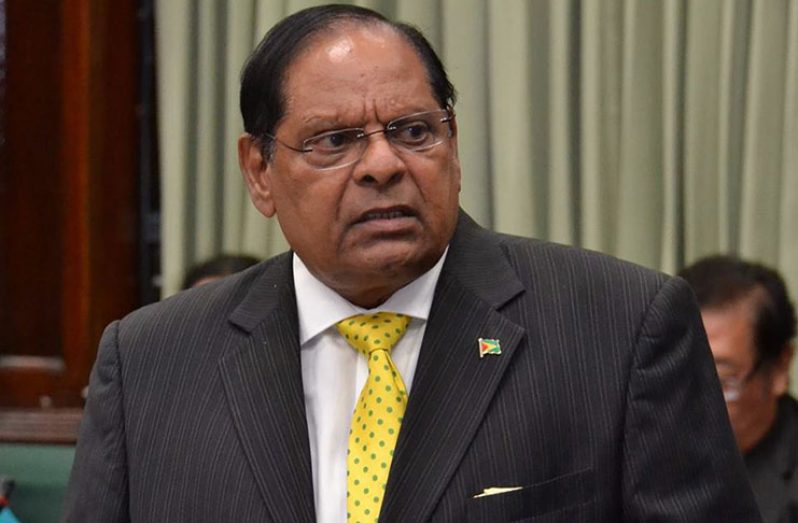By Navendra Seoraj
AS Guyana continues to grapple with the effects of the Novel Coronavirus (COVID-19) pandemic, local authorities have started to explore new avenues for strengthening capacity to reduce the spread of this disease, with the latest move being the authorisation of private institutions to test for COVID-19.
“We have given the green light for private hospitals to import testing kits so they could supplement and do rapid testing,” said Head of the National COVID-19 Task Force, Prime Minister Moses Nagamootoo during a virtual press briefing on Saturday.
With the new system in place, testing for the dreaded disease will be done by both state and non-state institutions in the near future.
Prime Minister Nagamootoo said private institutions are key partners in the fight against the pandemic, and this move will alleviate existing concerns about government having a “monopoly” with regard to testing.
“Private institutions are now brought into play and they are a key partner…they will work out conditions under which they do the testing, because in some cases persons prefer to go to private institutions instead of the public institutions, where treatment is free,” he said.
The prime minister, however, believes it is “reasonable” and “feasible” for private institutions to seek support from the state, in terms of doing tests and managing positive cases. Government has already asked hospitals to designate a space in their facility for treatment and management of persons affected by the COVID-19 disease.
So far, through the public health system, over 175 persons have been tested for this disease and about 40 persons have tested positive, while over 130 have tested negative.
Just last week, Managing-Director of the Guyana Water Incorporated (GWI), Dr. Richard Van- West Charles, who is also an experienced medical expert, called for a review of the testing guidelines.
“There are many parameters to be considered and testing cannot depend on an all-or-none principle based on the clinical fit. Medicine is a socio-psychobiological science. However, the delay in testing in our society is taking us close to the time bomb,” said Dr. Van-West Charles, in a recent post on his Facebook page.
The Ministry of Public Health has been using “strict” Pan American Health Organisation/World Health Organisation (PAHO/WHO) guidelines to test persons for COVID-19. Dr. Charles, while acknowledging the current guidelines, pointed to the fact that the PAHO/WHO has projected that Guyana could have 20,000 cases of COVID-19 in a month.
The Ministry of Public Health, using the PAHO/WHO model, had initially projected 1,400 cases, but a recent study done by PAHO/WHO found that with every case, another 2.5 persons will be affected within five days if there is no partial lockdown and if persons do not exercise effective social distancing.
“That 2.5, if I infect you, you infect 2.5 others and they infect another 2.5. Within a month we will get over 20,000; it a simple model but it makes a lot of sense,” said Resident PAHO/WHO Representative, Dr. William Adu-Krow, in a recent News Room report.
Dr. Adu-Krow had said that if this should happen, five per cent or 1000 of those infected would need intensive care and Guyana simply does not have the capacity for this. Guyana has so far tested over 115 persons.
“Think about it, if according to WHO by May we should have 20,000 cases and to date we have only tested 75 (this has moved to over 115), the health status of our exposed cases would be deteriorating and by the time we make an intervention it is too late.
“I appeal to physicians and I hope the authorisation is only in the hands of physicians and not some bureaucrat to urgently review the testing guidelines for Covid-19. Delays may contribute to more deaths,” said Dr. Charles.
He believes it is better to test early and discover where the situation is, than just fail to test. His view is that this way will control transmission of the disease.
Globally, there are close to 1.5 million cases of COVID-19 and over 80,000 deaths. And, with no approved treatment or cure, there is no assurance that persons will survive after contracting the disease. In the absence of approved medication, governments and authorities across the world have employed a number of preventative measures to contain the spread of the disease.
“Let me take this opportunity to remind you that there are no vaccines nor medications to address the coronavirus disease; the medical personnel will treat you according to the symptoms you present,” said Minister of Public Health, Volda Lawrence in a recent update on the outbreak.
A virtual meeting was, however, convened on Thursday to discuss alternative testing modalities, such as the use of rapid testing and to discuss the use of medications such as hydroxycholoroquine & choloroquine to treat COVID-19.
Participants of the meeting included technical experts from the Pan American Health Organisation (PAHO), Washington, representatives of private hospitals, the medical council, the private sector and members of the media, said Minister Lawrence.
According to the World Health Organisation (WHO), COVID-19 is an infectious disease caused by the newly discovered coronavirus. WHO said most people infected with the COVID-19 virus will experience mild to moderate respiratory illness and recover without requiring special treatment. Older persons and those with underlying medical problems such as cardiovascular disease, diabetes, chronic respiratory disease, and cancer, are more likely to develop serious illness.
The WHO believes that the best way to prevent and slow down transmission is to be well informed about the virus, the disease it causes and how it is spread.
“Protect yourself and others from infection by washing your hands or using an alcohol-based rub frequently and not touching your face. The COVID-19 virus is spread primarily through droplets of saliva or discharge from the nose when an infected person coughs or sneezes, so it’s important that you also practise respiratory etiquette (for example, by coughing into a flexed elbow),” the WHO has advised.



.jpg)








